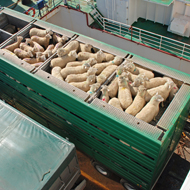
Ramsgate disaster prompts MP to introduce a bill
Councils may be given the power to ban live animal exports from ports they own, after Craig Mackinlay MP introduced a bill in the House of Commons on Tuesday (10 May).
Mr Mackinlay, MP for South Thanet, spoke of the tragic events at the Port of Ramsgate in September 2012, where dozens of sheep died or were euthanised.
When the AHVLA (now APHA) inspected the vehicle, they found it had been poorly loaded and overstocked. One sheep had a broken leg and many more were lame or had trapped limbs. Six lambs fell into the water when the floor collapsed, of which two died and four were rescued by the RSPCA.
Following the case, Thanet District Council suspended further shipments for a period of time, but was later found to have breached an 1847 law and ordered to pay compensation of more than £4 million.
"This ruling means that local people are powerless to end a practice that many find barbaric - councils cannot turn away live exports," Mr Mackinlay said.
"I think it's right that local people have a say in animal welfare standards in their area. When local people own ports, like in Ramsgate, they ought to be able to ban the exportation of live animals for slaughter, a practice many find barbaric."
During the 10 minute rule bill, however, Andrew Nuttall MP spoke against the proposal, saying that while the UK remains part of the EU, parliament is "powerless" to change the legislation in the manner proposed.
Nonetheless, a majority of MPs voted to bring the bill forward, allowing it to progress to the next stage.



 The Veterinary Medicines Directorate (VMD) is inviting applications from veterinary students to attend a one-week extramural studies (EMS) placement in July 2026.
The Veterinary Medicines Directorate (VMD) is inviting applications from veterinary students to attend a one-week extramural studies (EMS) placement in July 2026.